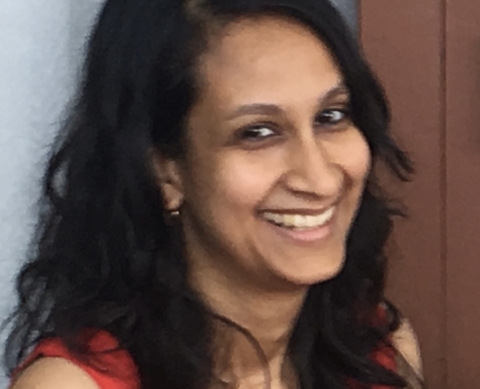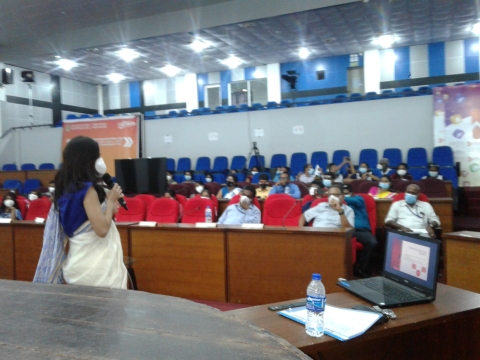

For the month of March, our PGR Student Spotlights are being taken over by five women, each representing one of our five faculties, in celebration of International Women's Day. Their mission is to inspire inclusion.
3 minutes
Our Faculty of Humanities and Social Sciences Student Spotlight is Thirsha de Silva.
What is your research?
I am a first year full-time international PhD student with the School of Area Studies, Sociology, History, Politics and Literature. My research focuses on the mental well-being of part-time and distance learning postgraduate researchers.
Tell us a bit more about your research.
Mental health and well-being have become increasingly of interest to everyone, especially since the COVID-19 pandemic. Concerns around the rise in mental health issues are not limited to the general public but can be seen in the world of higher education as well. Interest in student well-being has led to a number of mental health resources, guidelines and frameworks being created (e.g. – the University Mental Health Charter and Stepchange). While this is fantastic, most of the research and frameworks seem to focus on the undergraduate experience and do not really consider the unique challenges faced by postgraduate students.
In talking about postgraduate study, I think many of us have heard that a PhD can be an extremely stressful and isolating experience. This is reflected in the research surrounding mental well-being of postgraduate researchers. We see a range of common mental health issues such as anxiety and depression presenting in postdoctoral researcher samples. Research also states that there are multiple factors that impact doctoral researcher well-being such as feelings of isolation, lack of belongingness within the academic community, financial concerns, interpersonal issues and imposter syndrome.
Apart from these general factors that affect postgraduate researchers, research emphasises how part-time and off-campus students such as distance learners are at-risk populations for mental health issues. These cohorts will be the main focus of my research project. Previous research in undergraduate and postgraduate distance learners have shown that they feel a lack of connection with the on-campus community and tend to feel more isolated. These issues may be exacerbated by challenges at home and at work that distance or part-time doctoral researchers may be juggling. I will be using qualitative research methods in this sociological exploration of doctoral researchers’ mental well-being. As I am an international student myself, I want to ensure that the sample represents the diversity of voices in our doctoral researcher community. I hope my project will add to the growing field of research around postgraduate researchers’ mental health, and challenge the current individualised approach to tackling mental health and well-being.
Empowering experiences with inspirational women.
I am terrible at talking about myself so writing this section of the blog in itself is quite an achievement! Since I am writing during the celebration of International Women’s Day, I would like to highlight a few women who have made an impact on me.
I would not have actively thought of pursuing a PhD without one of my mentors Dr. Gayani Gamage. She nudged and encouraged me over the last few years to seek out an experience that would expand my knowledge and skills. Dr. Gayani was instrumental in me being able to be part of some amazing experiences related to distance education and I admire her meticulousness and pioneering spirit. She included me in the team of professionals who contributed content to the course books that are currently being used as part of the first ever BSc in Psychology programme offered by the Open University of Sri Lanka. Following this, I was also offered the opportunity to teach on the programme as a Visiting Academic. This experience was vital to me becoming interested in the challenges of distance education, and played a key part in me applying to the PhD project that I am currently working on.
Another amazing professional that I look up to is Dr. Kotryna Fraser, the current Chair of the Equity, Diversity and Inclusion Advisory Group of the British Association for Sport and Exercise Sciences (BASES). I got to know her during my time as a member of this advisory group. I really admired how she would moderate and navigate tough conversations and how quick she was in her critical appraisal of just about anything. Working with Kotryna was amazing as she showed me how collaboration worked in academic spaces, and truly made me feel that my voice was valuable. She invited me to be part of a working group tackling sex and gender in sport and exercise settings, which led to an article that was published earlier this year. I learnt so much just through the conversations had with the brilliant minds who worked on this project! Kotryna also often called me out whenever my imposter syndrome made an appearance and for that, I am grateful!

Thirsha delivering a session on Intellectual Disabilities at a seminar organised by the National Paralympic Committee of Sri Lanka.
Finally, I am inspired by everyone I cross paths with here in the University. Among my incredible colleagues (all of whom I am in awe of because they all have such brilliant minds!), I am currently in awe of Brooke Wain (a third year PhD student at the Centre for Enzyme Innovation). Her proposal for a well-being programme for postgraduate researchers was awarded a grant by the Postgraduate Research Culture Fund. The programme consists of five workshops tackling areas pertinent to postgraduate mental health, such as discussing self-care, addressing imposter syndrome and increasing mental health literacy. I love how proactive and passionate she is when it comes to postgraduate mental health. I have been very lucky that the Graduate School connected me with Brooke to work on the content creation and delivery phases of the project. It has been so fulfilling to collaborate with Brooke. To know this early on in my PhD that there is a well-being programme that has been created by students for students is quite encouraging. I am looking forward to our pilot run of the programme, and to explore how we can adapt this programme so that we can address well-being not only for full-time postgraduate researchers but also for our postgraduate researchers who are part-time and distance learners!
If you would like to feature in our student spotlight section please email graduate.school@port.ac.uk to discuss this further.
Enable University alerts
Turn on notifications for critical updates like closures, safety alerts, and urgent service disruptions.





